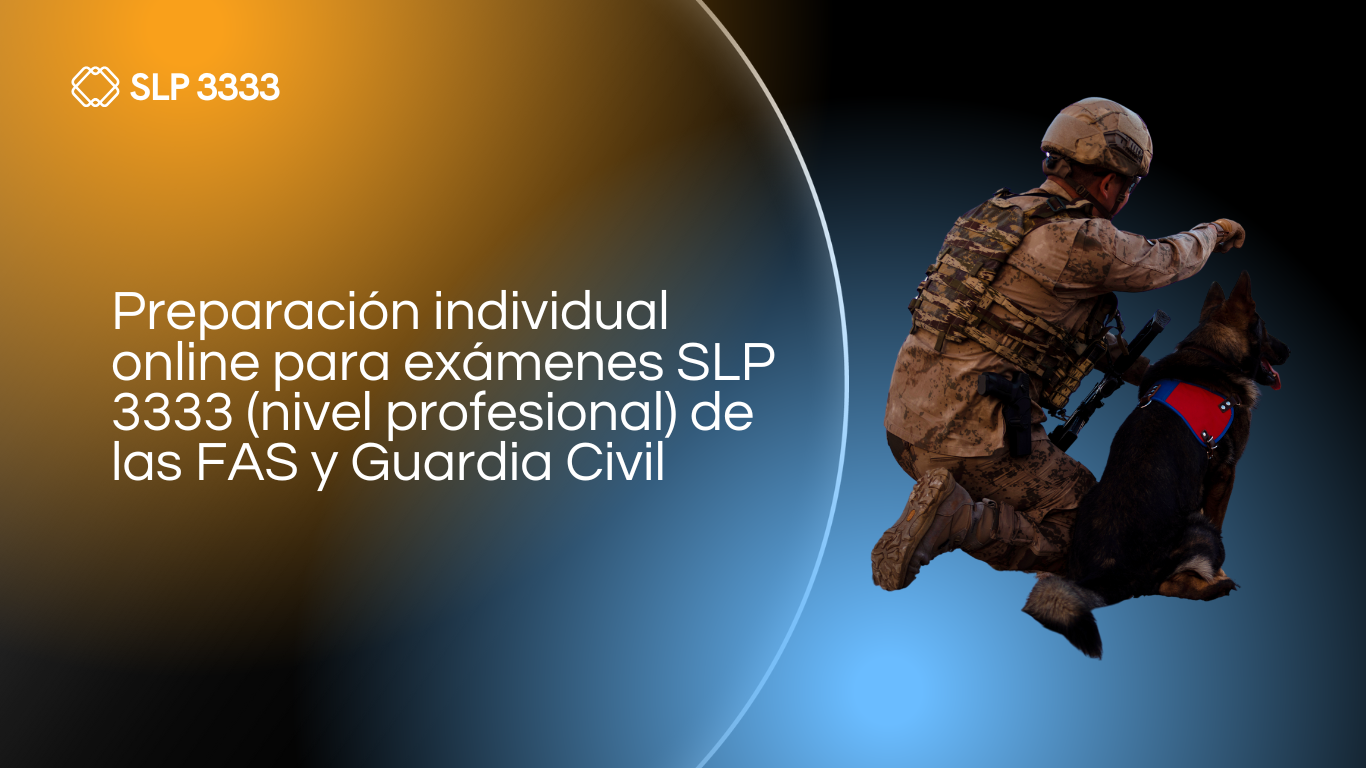¿Que es?
Cursos de inglés para personal militar y Guardia Civil que necesitan acreditar o revalidar el nivel SLP 3333 (profesional) ante los Tribunales de Idiomas de las FAS y de la Guardia Civil.
Los cursos y clases de inglés en línea son individuales y personalizados, y ayudan a mejorar los resultados en las pruebas SLP 3333.
El alumno recibe material didáctico de actualidad para practicar la comprensión de textos y ampliar vocabulario.
Además, obtiene pautas y consejos para redactar de manera impecable y superar la parte escrita del examen.
Según el plan elegido, dispone de tutorías individuales de 30 minutos, que se realizan en línea a través de Zoom, Google Meet, o WhatsApp voz.
Cursos completos totalmente personalizados y flexibles
Adaptado a sus necesidades y disponibilidad, el objetivo principal del curso es darte la mejor oportunidad posible para alcanzar sus objetivos lingüísticos. Si estás motivado, yo también lo estoy.
Cursos disponibles
*Tiempo estimado si se realiza las clases Speaking de forma semanal
*Si necesitas algo más a medida, hablamos
Si no quieres un curso completo tenemos:
Clases de Speaking (tipo entrevista oral)
Si tienes la prueba SLP 3 en breve y quieres tener más seguridad con tu nivel, estas clases sueltas son perfectas. Son individuales y se enfocan al estilo de la entrevista oral. Comprar las por bonos de 2, 3, 5 y 10 sesiones de 30 minutos de duración. (mínimo 2)
- Enfocados al estilo de la entrevista oral
- Una mejora garantizada de pronunciación
- Una mejora garantizada de fluidez
- Feedback oral durante la sesión
- Feedback escrito después de cada sesión
Bono 5 clases tipo entrevista SLP
Bono 10 clases tipo entrevista SLP
Corrección de redacciones
Poca gente no nativa domina este aspecto del inglés. Corregimos tus redacciones para que sepas si estás escribiendo correctamente y te damos consejos para mejorar.
- Los corrigimos
- Te explicamos los errores
- Te damos consejos sobre cómo mejorar
Corrección de 3
Corrección de 5
Reseñas
lo que buscaba, comodidad y flexibilidad
Las clases con Stuart fueron lo que buscaba, comodidad y flexibilidad para compatibilizar las con el horario laboral. Me ayudó a conseguir el nivel necesario para superar las pruebas de SLP 2222 sin problema alguno. Volveré con él sin duda para continuar mejorando!!!
Dani
Guardia Civil
Recomiendo
Recomiendo prepararse con Stuart para el examen del SLP. Conoce bien el examen y su estructura. En mi caso obtuve los 3.3.3.3. Ideal para preparar el tan temido Speaking en especial.
Francisco
Guardia Civil
I passed SLP 2222
It was hard but Stuart helped me prepare well the SLP 2222 exam. Now I have it.
Pablo
Guardia Civil
Curso perfecto…
Curso perfecto por la adaptación de horarios y calidad de las clases. 2 2+ 3 2.
Alberto
Ejercito
Recomendable 100%
Sin duda las clases de speaking con Stuart me ayudaron a conseguir con éxito el SLP 2.2.2.2 en solo 2 meses. Clases amenas y se adaptan a tus horarios. Recomendable 100%
Diego
Guardia Civil
Máxima flexibilidad en el horario
Muy amable desde primera hora. Máxima flexibilidad en el horario, debido a los turnos tuvimos que cambiar el horario un par de veces y sin problemas. Me ha resultado de gran ayuda, muy recomendable. Al final conseguí el nivel SLP 2.2.2.2.
Antonio
Guardia Civil
el mejor profesor que he podido encontrar
Stuart es el mejor profesor que he podido encontrar, incluso a distancia, me ha ayudado muchísimo, teniendo una base de inglés y en cuestión de 8 semanas he conseguido el nivel 2 en inglés! Si estáis buscando un profesor implicado y con conocimientos en el examen, no dudéis en contactar con el! Públicamente quiero agradecerle la implicación que ha tenido! Thank you Stuart!
Carlos
Ejercito
Muy buen trabajo
Muy buen trabajo! gracias a stuart! Se nota que tiene gran experiencia en este ámbito y saben lo que piden en los slp. Te orienta de forma práctica y focalizada para lograr el objetivo adaptándose a tu nivel.
Juan
Guardia Civil
Muy buena experiencia
Hace un par de meses estuve preparando el nivel SLP 2.2.2.2 con Stuart. Mi experiencia fue muy buena, destacar el trato totalmente personalizado y el seguimiento semanal que se hace al alumno, lo cual permite valorar los avances semana a semana e ir ganando confianza, que es lo importante en estos exámenes. Te preparan concretamente las pruebas que vas a hacer el día del examen, y se nota que tienen mucha experiencia preparando alumnos. Yo personalmente, noté mucha mejora en el speaking, que era lo que más miedo me daba y lo que más trabajamos. Al final saqué el nivel 2.2.2.2 a la primera, así que lo recomiendo 100%.
David
Guardia Civil
Para más información
Te explicaré el funcionamiento de los cursos



